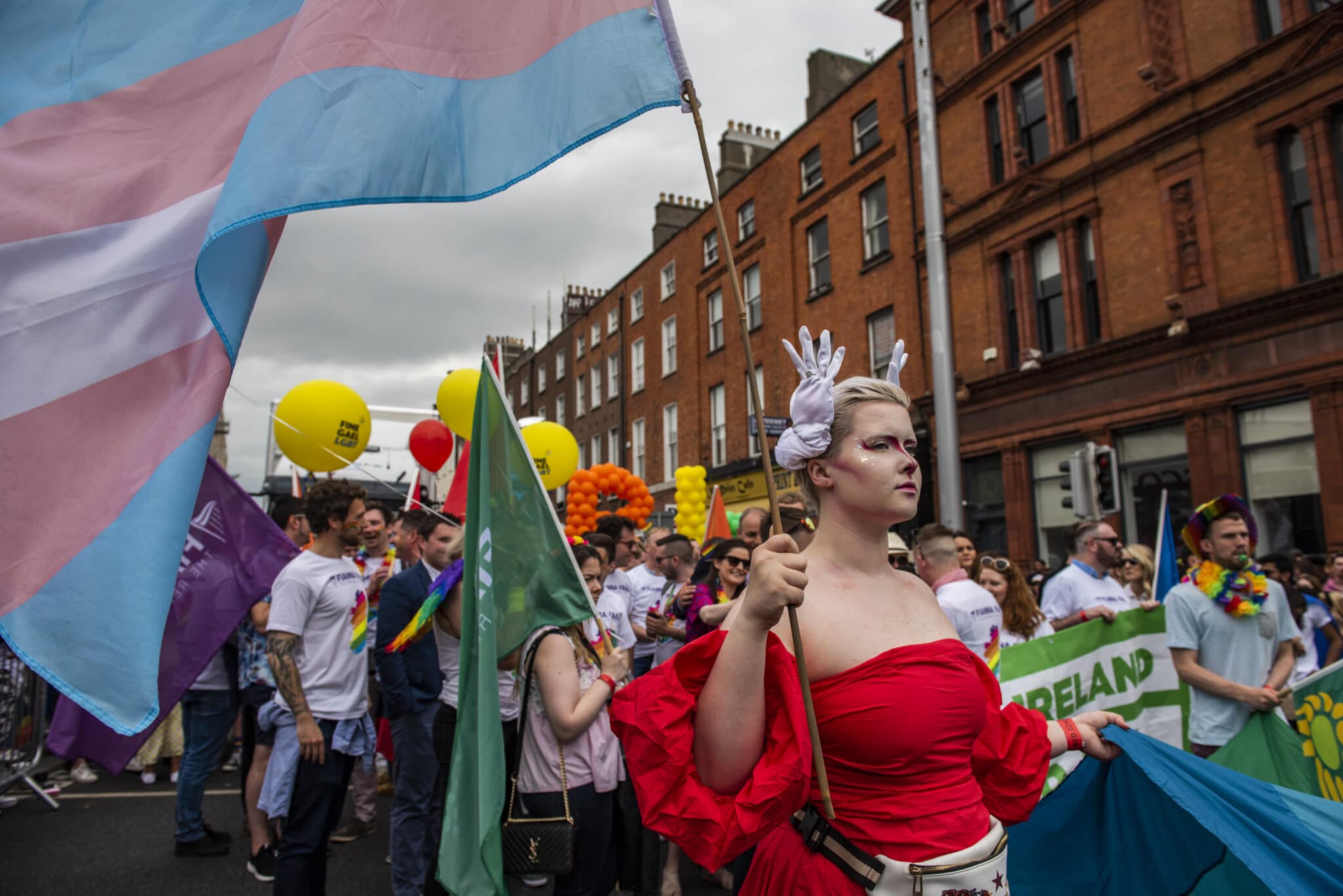Person waving a trans Pride flag at Dublin’s Pride parade in 2019.
(Szymon Barylski/NurPhoto via Getty Images)
Ireland’s only gender clinic “does not have capacity” to see the 300 trans people who are being referred to it each year, according to its lead clinician.
Writing for the Irish Times – and breaking a four-month trans-led boycott of the newspaper over it publishing anti-trans rhetoric in doing so – Dr Karl Neff said that although Ireland’s national gender service has recently expanded, “We are receiving more than 300 referrals per year and do not have capacity to see 300 people per year.”
The service has capacity for 150 patients per year, or three a week, and says it is recruiting more staff to address the issues.
Neff explained: “Without sufficient staff, we are unable to see people for their initial assessment as quickly as we would like, and waiting times continue to increase.
“Similarly, we are unable to offer the wide range of support services for people as they move through their medical transition.”
Labour Youth supports the Trans Writers Union and their boycott of The Irish Times #boycottIT (1/4) pic.twitter.com/jYOJeEvHRz
— Labour Youth (@labouryouth) December 13, 2021
Given Ireland’s population of nearly five million people and common estimates that around one per cent of people are trans, it’s likely that there are 50,000 trans people in Ireland.
As well as failing to provide healthcare, the national gender service, based at St Columcille’s Hospital in Loughlinstown, Dublin, only launched a website to advertise its services, and provide information about care pathways and waiting times, in 2021.
As a result, the number of trans people fundraising online to pay for private trans healthcare in Ireland nearly doubled between 2018 and 2019.
Neff said that the national gender service, which has existed in some form or other for more than 20 years, saw a clear change in the number and profile of trans people being referred to it around 2014. This corresponds to what is commonly called the “trans tipping point” – increased trans visibility in the media sparked by actress Laverne Cox appearing on the cover of Time magazine in 2014.
However, the service has also changed how it assesses patients: From 2018, a new model of care for the national gender service was implemented that is based on a “comprehensive multidisciplinary psychosocial assessment prior to medical transition”.
This is necessary, Neff said, because: “While medical transition can produce many benefits, it is, as all clinical interventions are, associated with a significant risk of complications. The complications of medical transition that are most common are not specifically gender related. The complication termed transition regret (when someone has gone through medical transition and regrets it as they no longer identify as transgender) is rare.
“The more common complications of medical transition relate to a decline in mental health or social function that occurs when a person’s needs have not been met prior to and during their medical transition.”
His comments are at odds with multiple scientific studies that have found accessing gender-affirming healthcare improves mental health outcomes for both trans adults and trans youth.
Healthcare for trans youth in Ireland
Trans youth in Ireland currently have no public healthcare options available to them and must go abroad for healthcare.
Younger trans adults will be seen by the national gender service run by Neff. He said that up till 2014, most referrals were for trans adults over the age of 30. Now, the majority of people referred to the service are in their late teens or early 20s.
Ireland’s Health Service Executive (HSE) announced this year that they will address this gap in healthcare by are creating a team to provide healthcare for trans youth in Ireland.
However, HSE began by recruiting a psychiatrist for the lead role within the service, a move that was criticised for “persisting with outdated and possibly discriminatory ideas about what it is to be trans”.
Irish journalist Taryn de Vere, who has a trans child, said: “My concern is that the HSE are still linking being transgender with mental illness.”
She added that because mental health professionals have historically played a role in the stigmatisation and in some cases torture of trans people, via conversion therapy efforts, “it is reasonable to expect that the trans community may harbour some doubts and suspicion about the mental health profession”.
No provision for gender-affirming surgery in Ireland
Similar to the lack of healthcare for trans youth, there is currently no provision for gender-affirming surgery in Ireland.
While Neff writes that the majority of those referred to the national gender service decide not to have surgery, he does not investigate whether this is because they are already aware that gender-affirming surgery is not something that the national gender service can provide.
“Gender affirming surgery can be very beneficial but as an experience can have a significant emotional toll on the person while they are recovering,” Neff said. “It would be much better to have the option of having these operations closer to home, with their support network close by.”
He concludes: “Our goal is to provide a world-class service with a full range of supports and interventions for people moving through a medical transition. With sufficient resources, that goal will be achieved.”
